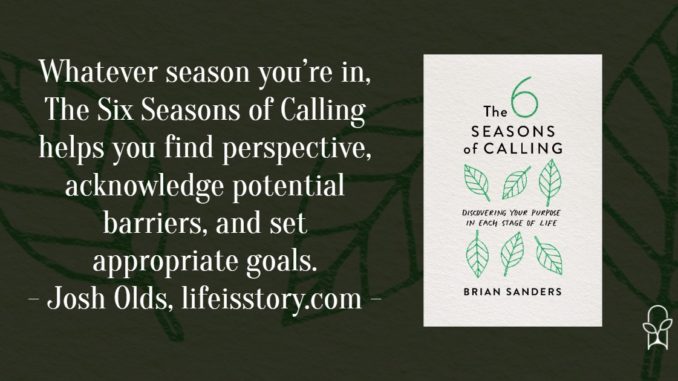
Published by Moody Publishers on January 5, 2022
Genres: Non-Fiction, Christian Life
Buy on Amazon
Goodreads

What if you don’t have a calling from God . . . but callings?
Often we think of our calling as a singular moment of divine purpose revealed to us in young adulthood and static for the rest of our lives. But consider how God usually works. He created the cosmos in six successive days. Might He not also have six seasons of calling for the lives of His people?
In The 6 Seasons of Calling, Brian Sanders helps you view your calling as something ongoing and dynamic. Because your calling is rooted in your relationship with God and your perception of His voice, it isn’t a static or one-time experience. Of course, your calling doesn’t constantly shift and change. Yet God has ordained six basic seasons as your life unfolds:
Childhood – the season of bondingAdolescence – the season of learningEarly Career – the season of servingMid-Career – the season of creatingLate Career – the season of givingTransition – the season of leavingInstead of wandering aimlessly through life, let the six seasons of calling provide structure for your development. Locate yourself in this sequence. Live mindfully in each season. Learn from its lessons. Look for what might be next. And remember . . . only at the end of your life will you see why each season was valuable and not to be rushed.
Life has seasons. That’s something I’ve been reflecting on recently as I’ve gone through a sort of extended period of transition, following God and figuring out what the next steps in life are. Sometimes I struggle with feeling like I haven’t done enough, haven’t accomplished all the goals I have. Other times I look back on my past and wonder why I ever decided to leave. Growth is difficult. Moving on is hard. Discovering the different seasons of life is something that’s tricky to navigate and subjective to the individual. In The Six Seasons of Calling, Brian Sanders sketches some general guidelines to help navigate life’s tricky transitions.
One thing I appreciated about the book is though Sanders gives a structure to his seasons—developing them is six 12-year chunks, he’s also clear that this is a general guide. It’s not a strict roadmap and you’re not behind or ahead if you find yourself elsewhere on the scale. It’s an easily generalizable scale that also manages to be practically applicable, which is a difficult balance to manage.
The Six Seasons of Calling are as follows:
|
Day |
Age | Core Developmental Concept | Ideal Developmental Condition | Primary Developmental Threat | Calling & Identity |
| 1 – Childhood | 0-12 | Bonding | Play | Fear & Isolation | Child |
| 2 – Adolescence | 12-24 | Learning | Agency | Inversion | Student |
| 3 – Early Career | 24-36 | Serving | Challenge | Entitlement & Impatience | Worker |
| 4 – Mid Career | 36-48 | Creating | Impact | Greed | Maker |
| 5 – Late Career | 48-60 | Giving | Scale | Distraction | Mentor |
| 6 – Transition | 60-72 | Finishing | Celebration | Obscurity | Mystic |
Despite the potentially imposing chart, Six Seasons of Calling is easy to understand. Sanders uses personal stories and vignette examples to bring each stage to life. As you can see, each stage comes with a core concept, an ideal condition, and a developmental threat. For example, in Mid-Career, individuals are commonly at the peak of their career and earning potential. They’ve put in the work and been rewarded with a position that allows them creative control and gives them power to really have an impact on their business and on other people. The primary threat to this is greed—where having finally been empowered, the individual fails to use their power wisely.
I do wonder, however, Sanders might approach someone who is not in the business world or has had a nontraditional career path. Increasingly we’re seeing individuals in their 30s and 40s be entering their career or stuck in a series of jobs with no real career trajectory. With the job market changing, the career portions of Sanders’ model may end up muddled and less applicable to many people.
Further, I question the validity of reducing the concept of calling to one’s career. The Six Seasons of Calling begins well—I love that play is seen as the calling of childhood—but when Sanders transitions to “career,” the implication becomes that one’s career is one’s calling. And that’s just not true for a number of people. Vocation may be a part of one’s calling, but should be the sum of it. Humans were made for more than work—even between the ages of 24 and 60.
If Sanders had positioned this as a business book or career-focused, I don’t think that I would have minded so much. It doesn’t necessarily affect the content of the book, but I would consider this as more of a business book—but maybe that’s how most people think about calling.
Whatever season you’re in, The Six Seasons of Calling helps you find perspective, acknowledge potential barriers, and set appropriate goals. It’s a way of looking at different eras of life as meaningful in different ways and acknowledge how one’s calling and career changes over that time.
